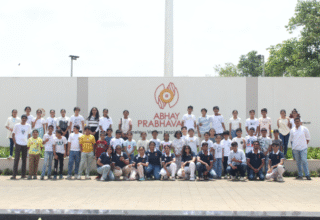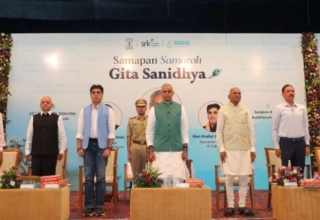
Sugandha Shukla, a Class 12 student of The Scindia School, Gwalior, seeks to educate an overwhelming majority (including parents) of people, who pooh pooh liberal arts without knowing the vast and critical role of multi-disciplinary knowledge in shaping human civilization in past, now and future
“What is this modern wish-wash of a liberal arts education?” “Studying all subjects? Bah! A Jack of all and Master of none! That is what our child will become!” “A complete waste of time!”
THIS IS HOW MOST PARENTS, teachers and even students in India react to the idea of a liberal arts education. But can they really be faulted when the majority of us remain unaware of the deeper meaning and significance of the liberal arts?
Liberal arts is not a modern idea. It existed in the ancient and medieval eras too. Only, during that time, it was so natural to study subjects in relation to each other that there was no need to separately label this type of education as ‘liberal arts.’Philosophy and arts went hand in hand with science and math because scholars understood how deeply they influenced each other.
Leonardo Da Vinci was an artist, polymath, architect, sculptor, musician, mathematician, engineer, inventor, anatomist, geologist, cartographer, botanist and writer all rolled into one. He wasn’t a genius because he had mastered these diverse fields, but because he was a curious thinker who realized the important relationship between these subjects and studied them all. He employed his engineering skills in his artistic work, his artistic skills in cartography and cartography in geology.
Rene Descartes, who propounded the theory of the Cartesian plane is also the Father of Modern Philosophy. Richard Ark wright, who invented the water frame used in textile production, was a barber and wig-maker! Edmund Cartwright, who invented the power loom, studied literature, medicine and agriculture and knew very little of mechanics. These inventions were a result of determination, curiosity and brilliant thinking. And that really is all that matters in any education!
So what is a liberal arts education all about? At the fundamental level, it is about breaking the disciplinary boundaries and defying the conventional practice of stereotyping students according to the subjects they study. It is about realizing the interdependency of subjects that are seemingly unrelated. In a liberal arts education, students learn that science and history, though superficially unconnected, are in fact so closely intertwined that one cannot exist without the other. When they study a scientific theory, they also assess the historical and political circumstances under which it was formed and the factors that could have affected the scientific judgment.
Liberal arts train students to become independent thinkers and discuss all issues of importance in the world, irrespective of the subject they are pursuing. They are taught to draw conclusions and make decisions with whatever knowledge is available. They learn basic skills that are crucial to all fields communications, creative writing, persuasive speaking, basic mathematics and logical reasoning, political science and history.
Liberal arts are thus not merely a side option in Indian education, they are a dire necessity! We need them so that students don’t just get a degree, they also become capable of securing a job with their diverse skills. In a deeper sense, however, we need liberal arts to create a better, free-thinking and sensitive society something that will help eradicate evils like gender and caste discrimination, violence,and dowry. Most of these practices exist due to narrow-mindedness and intolerance. A liberal arts education creates a generation that is sensitive, open to new ideas and questions injustice.
Let’s first understand how a liberal arts education makes students more ’employable’. There is not a single real-life issue that can be solved with the limited knowledge of just one discipline. Imagine a situation where you work with a company wanting to start a new venture in a new city and you need to analyze all the factors and risks. There is a long list of areas you will need to study the terrain and transportation routes, the local resources, state policies and laws, the nature of demand for your product, the local language, and even a bit of geography, political science, and economics. This is the type of skill most professions demand today. They want people to step out of their comfort zone and study new things when the need arises. Liberal arts provide an intellectual breadth a “license to learn” that prepares students to thrive in a complex, globalized, ever-changing and diverse world.
But let us for a moment just focus on what education actually means. In our country, where poverty is widespread and education is considered as a means of obtaining livelihood, it is difficult to think otherwise. Yet, fundamentally, education is not only about the kind of job we do, but about the kind of people we become. It is about how our thought process works and what kind of judgments we make.
A liberal arts education works on the principle that both natural sciences and social sciences are equally vital. While the former are important to understand the laws of nature that govern the physical universe, the latter are critical to understand what governs mankind. And thus, a liberal arts education makes us better human beings. We need it so that people practice their professions understanding the moral implications of their actions in a bigger picture. Scientists should be able to think about thepolitical, environmental, economical and ethical implications of their inventions and doctors should be able to make the right moral decision when asked to abort a girl child.
Why should students not be allowed to study history and math, or physics and political science together? What can possibly be the explanation for studying them together, people ask. But if a student is brilliant at both these subjects and equally passionate about them, why should any other explanation be required? When we choose subjects, we need to stop making our decisions based on what material returns they will give us and instead think about where our passion and curiosity lie. As long as we’re good at something, it doesn’t matter what it is we’re good at, because excellence does bring out results









